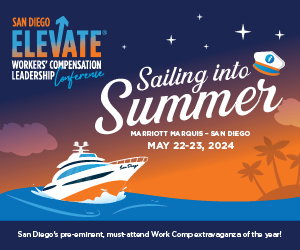Industry Insights
March 19, 2018
Mullen & Filippi: About the Court of Appeal's Pike Decision
- State: California
- - 1 share
On March 6, the California Court of Appeal issued its decision in County of San Diego v. WCAB (Pike), holding that for injuries on or after Jan. 1, 2008, an injured worker is not entitled to receive temporary disability benefits for any dates more than five years after the date of injury.
The decision was certified for publication and is now citable, binding authority on all cases going forward.
The facts of this case form a familiar pattern: An applicant with a shoulder injury on July 31, 2010, settled his case in May 2011 by stipulations, then filed a petition to reopen in May 2015. The petition to reopen alleged that his condition had worsened. He sought additional temporary disability benefits, which were paid through July 31, 2015.
Defendant stopped paying benefits because Labor Code §4656(c)(2) provides that temporary disability benefits for an injury occurring after Jan. 1, 2008, “shall not extend for more than 104 compensable weeks within a period of five years from the date of injury.”
Defendant interpreted that statute to mean that no benefits are due for any period more than five years from the date of injury.
Applicant contended that since the petition to reopen was filed within five years of the date of injury, and the new period of temporary disability started within that five-year period, the judge had continuing jurisdiction to award temporary disability benefits up to the 104-week cap, regardless of whether the temporary disability period extended beyond five years from the date of injury.
The trial judge agreed with applicant, and a Workers' Compensation Appeals Board panel, with one member dissenting, upheld the opinion. The dissenting member agreed with defendant’s interpretation of the law.
In this decision, the Court of Appeal acknowledged that, while it generally will give deference to the WCAB’s interpretation of workers’ compensation statutes, it is not bound by the WCAB’s interpretation and will not uphold it when it is clearly wrong.
The Court of Appeal held that the plain language of the statute, as well as the legislative history, prohibit awarding temporary disability benefits for a period beyond five years after the date of injury.
According to the decision, the applicant’s attorney and the California Applicants' Attorneys Association — which filed an amicus brief in support of the WCAB decision — argued that the judge could award temporary disability benefits for a period more than five years after the date of injury, because the judge has continuing jurisdiction over the case when a timely petition to reopen has been filed.
The court responded that even if the board has continuing jurisdiction to make decisions, it still has to follow the substantive law. The substantive law, clearly stated in the statute, prevents an award of temporary disability benefits beyond five years from the date of injury. The court took significant time in its opinion to make the distinction between jurisdiction to act and the requirement to follow the law.
The court also addressed the argument, which applicant’s attorneys seem to make in every case, that Labor Code §3202 requires the law to be interpreted liberally in favor of applicants.
The court’s response to this was almost sarcastic: “While we are mindful" of section 3202, this principle of interpretation cannot "justify an otherwise erroneous construction" of section 4656. That is because “the rule of liberal construction stated in section 3202 should not be used to defeat the overall statutory framework and fundamental rules of statutory construction.”
From a defense perspective, this opinion was a joy to read, because you can almost hear the Court of Appeal panel’s exasperation with the board panel’s interpretation of what the court clearly views as an unambiguous statutory rule.
While the applicant’s attorney can still seek review from the California Supreme Court, this opinion is so well written, logical and well supported that we doubt any further review will be granted.
Mullen & Filippi LLP is a workers' compensation defense law firm in California. This article is republished from the firm's bulletin with permission.
Advertisements
Columns
- Wickert: How to Sue Yourself and Win 05/01/24
- CAAA: May Day in the Golden State 04/30/24
- Langham: Uniformity in Regulations 04/25/24
- Kamin: Expanding the Good-Faith Personnel Action Defense 04/24/24
- Moore: Reciprocity Adds Authority 04/23/24
- Montgomery: Sedgwick Tries PPO Discount for Med-Legal (Again) 04/19/24
- Kamin: More Policy Exclusions Would Reduce Losses 04/18/24
- Phillips: It's All Settled 04/17/24
- Snyder: Public Benefit Rules Have Changed, but It Might Not Make a Difference 04/12/24
- Headrick: Clearing Up a Common Misconception 04/11/24
- Snyder: Litigation Guidelines Should Define Four Settlement Triggers 04/10/24
- Kirsch: Depositions of Comp Carrier Employees After Intervening in Third-Party Actions 04/09/24
- Wilson and Bennett: Could AI Have Prevented the Opioid Crisis in Workers' Comp? 04/08/24
- Moore: Pandemic Effect Over in March 2027. Really? 04/05/24
- Geaney: A Brief History of Our State's Workers' Compensation Act 04/04/24
- Kamin and Larres: Significant Panel Decision Clarifies Recon Confusion 04/03/24
- Gelman: Exposed to 'Forever Chemicals' 04/02/24
- Montgomery: Cyberattack Delays Payment of San Francisco Bills 04/01/24
- Young: Indoor Heat Regs in Turmoil 03/29/24
- Langham: Shootings and Compensability 03/27/24
Now Trending
- Workers' Compensation News
-
Calif. DWC
Launches Portal for QME…
Posted on Apr 24, 2024Dr. Ron Perelman says: “The problem is that most QMEs are older docs. Many are semiretired.…”Kimberley J Pryor says: “I had planned to post a well constructed comment, but I stopped…”
-
Calif. Worker Gets
Benefits for Crash Despite Leaving
Job Site Without Employer's…
Posted on Apr 25, 2024
-
Calif. Committee
Passes Bill to Eliminate Contractor
Comp Coverage…
Posted on Apr 26, 2024Gary Nelson says: “I think Dodd was right in 2022. …”
-
Calif.
Appropriations Committee Places TD
Bills on Suspense…
Posted on Apr 24, 2024
-
Calif. Newsom Says
Indoor Heat Safety Rules Too
Expensive for…
Posted on Apr 25, 2024
-
Calif.
Appropriations Committee Passes
E-Signature…
Posted on Apr 26, 2024
-
Calif. Assembly
Approves Bill to Add Right to
Attorney to Workplace…
Posted on Apr 29, 2024
-
Ntl. CLARA
Analytics, Origami Risk Announce…
Posted on Apr 30, 2024
-
Ntl. AP Sources:
DEA to Reclassify Cannabis as
Schedule III Controlled…
Posted on May 1, 2024
-
Fla. Employer
Can't Raise Exclusivity Defense to
Tort Claims From Worker Shot by…
Posted on Apr 29, 2024
Jobs
Upcoming Events
May 5-8, 2024
Risk World
Amplify Your Impact There’s no limit to what you can achieve when you join the global risk managem …
May 13-15, 2024
NCCI's Annual Insights Symposi
Join us May 13–15, 2024, for NCCI's Annual Insights Symposium (AIS) 2024, the industry’s premier e …
May 13-14, 2024
CSIA Announces the 2024 Annual
The Board of Managers is excited to announce that the CSIA 2024 Annual Meeting and Educational Con …
Social Media Links
c/o Business Insurance Holdings, Inc.
Greenwich, CT 06836





No Comments
Log in to post a comment